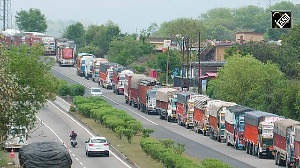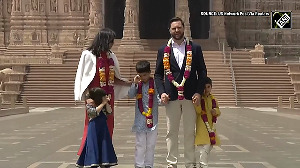The Pakistani capital and other parts of the country, including all those areas jolted by the Saturday 8 earthquake, received an aftershock this morning at 9.06 AM local time with the magnitude of 4.5 on the Richter scale. Earlier an aftershock at 1.23 AM was 5.6 on Richter scale and its epicentre was 135 kilometres north of Islamabad.
Thousands of residents in the Pakistani capital rushed out of their houses several times on Thursday as aftershocks rocked the city, fearing a repeat of the weekend quake that left thousands dead. Hundreds of employees working in offices located in high-rise buildings also came out into the streets. The 19-storey Margala Towers, an up market apartment block in Islamabad, had collapsed when the 7.6 magnitude quake hit Islamabad and other areas of Pakistan and PoK on Saturday.
So far, 43 people have been rescued and 93 bodies pulled out of the rubble of the apartment block by the local and international rescue teams. Rescue and relief work in PoK is still going on.
Top offices in several high-rise buildings have begun vacating following the quake that caused cracks on the walls of the buildings housing them. Most of the offices located in the Saudi Park Towers in Islamabad have already vacated the building. United Nations staff whose offices are also located in the building wanted qualified teams to study and certify the structure.
The fresh aftershocks jolted the already damaged buildings. However, no new damage was reported. Don Blakeman, a geophysicist at the United States Geological Survey's National Earthquake Information Centre, said the aftershocks would go on for months, possibly years, the official APP news agency reported.
Trucks and helicopters carrying aid from dozens of countries have arrived in Pakistan and troops and emergency workers are helping distribute the relief supplies to the affected so that basic facilities can be provided to millions of survivors of the quake. Rescuers have yet to reach some remote areas in Pakistan-occupied Kashmir where a number of bodies are still buried in the debris of the collapsed buildings.
As the UN warned that diseases could break out among the millions rendered homeless in the temblor, medical teams througout Pakistan and the world have rushed to the affected areas to treat the injured and prevent infections. Many hospitals were damaged and health workers killed or injured in the quake.
As official death toll crossed 25,000, hopes of finding survivors dwindled with the rescuers now focussing on supplying relief material to the injured and homeless. The World Health Organisation warned that measles, malaria and other diseases could break out among the survivors unless clean water is delivered to them. "Water is especially critical. People need it for basic survival, and to reduce the risk of infectious diseases. Unsafe water will lead to epidemics," it said in a statement. UN emergency relief chief Jan Egeland toured the devastated PoK in a helicopter to assess relief efforts.
In his address to the nation, Pakistan President Pervez Musharraf on Wednesday night praised the country for demonstrating unity in its response to catastrophic earthquake and appealed to all segments to coordinate their efforts and extend generous donations for early relief and rehabilitation of the quake-stricken people. "We have to convert this disaster into improvement, those who have lost their lives cannot be brought back but we can certainly bring about improvement in the lives of the affected, and we shall effect this improvement," he said.







 © 2025
© 2025